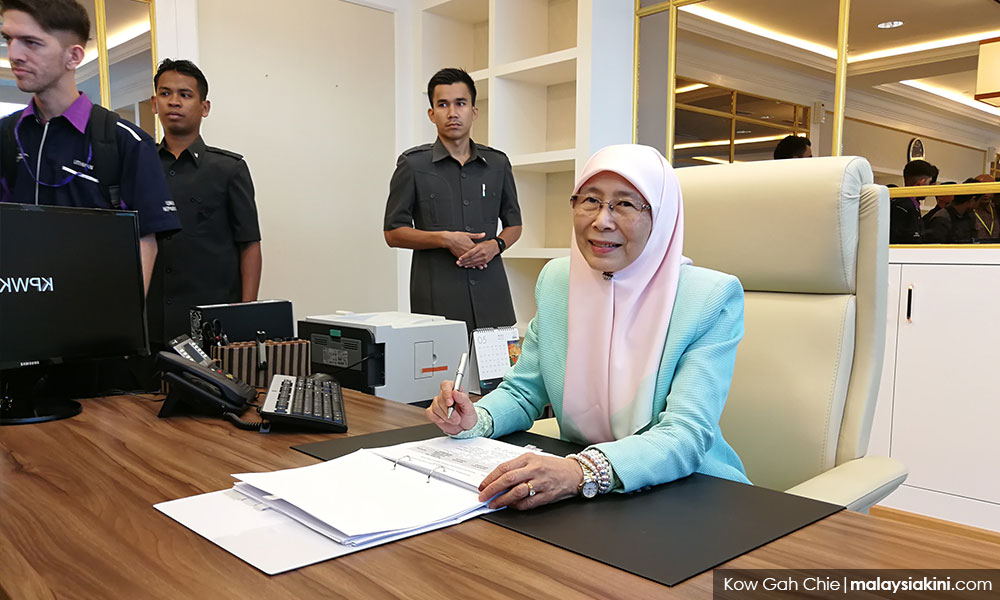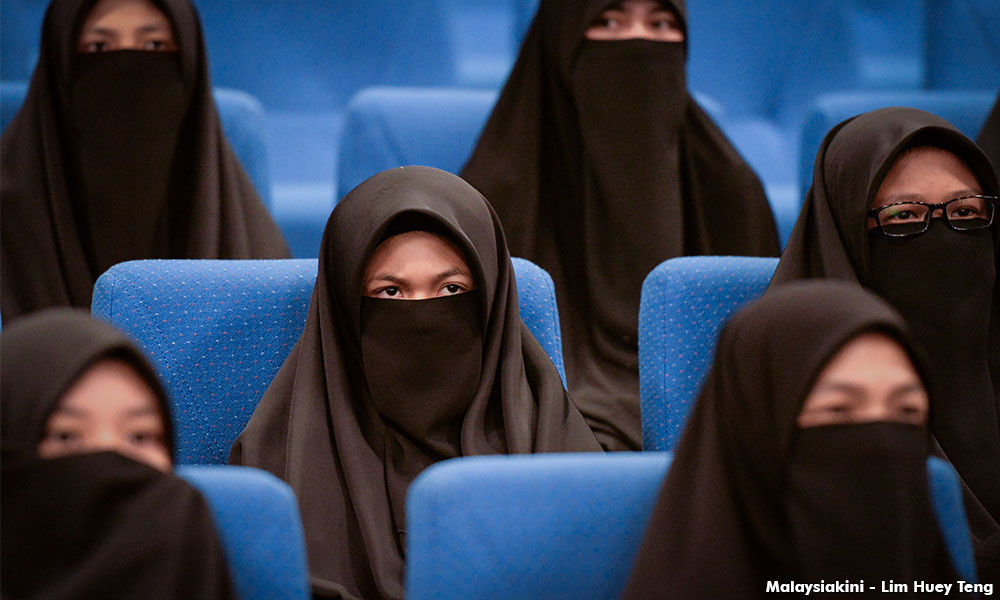
One of the important and crucial issues that is hotly debated among some Muslim scholars is connected with the position of Islam on the female headship of the state.
Some Muslim scholars based on their own interpretations of some Islamic texts, (a few verses of the Quran and a few prophetic traditions, the hadith), conclude that Islam does not allow the headship of state to a woman. The Quranic verse generally quoted in this connection is the following:
"Men are in charge of women, because what Allah has given one over the other and what they spend (for maintenance) from their wealth. (4:34)"
Generally, scholars who disagree with the headship of woman interpret the term "qawwam", as occurred in the above verse, in terms of the superiority of men over women in all social institutions and assert that men alone are eligible to be the heads of families and states, not women.
However, some other scholars assert that the above verse stands in context for the family; not the society and state. They contend that the above verse does not speak about the superiority of men over women but only talks about the financial responsibility of men for financial maintenance and protection of women because they are generally physically stronger than women.
I also agree with them and would add that the above verse sends the message on the complementing functions of men and women, based on some gender differences between them.

Men are exempted from child-bearing and childbirth because they are physically different from women. In the same way, women are exempted from taking financial responsibility as obligatory because they are physically constituted differently from men. However, it does not mean that women are forbidden from sharing financial responsibility with men because there is a difference between ‘obligation’ and ‘option’.
In short, the verse is throwing light on the complementing nature of works in a family and in no way does it makes men superior to women, either in family or in society, and therefore this verse cannot be taken as an argument to disallow women from political leadership.
As for the prophetic tradition, the following (hadith) is often cited by some scholars who reject the headship of women:
"When the Prophet (PBUH) heard that the Persians have made the daughter of Chosroes their king, he (the Prophet) said: "That nation will never prosper which puts a woman in command of its affairs."
However, there are many other scholars who assert that this prophetic tradition should be understood in context with the historical situation in Persia when the daughter of Khusroe was appointed the queen after a war in Persia and the queen was as despotic as the earlier despotic kings of Persia. Hence, the Prophet uttered these words for the despotic queen of Persia, not for every other woman.
Islamic position not anti-female headship
In this connection, we raise a question here: If Islam forbids women from leadership, why does the Quran refer to the rule of Bilquis, the ruler of Sheba and described her rule as one which is based on consultation, (27:23- 41) whereas the Quran condemned the pharaoh because of his tyranny and despotism (10:92)?
This being the case, the Islamic position on this issue is not anti-female headship or leadership. Well, Islam, as it can be understood from its pristine character, puts some conditions on any public participation of women that they should respect Islamic etiquettes of dress and social interaction and that their role in the family should not be jeopardised.
In other words, Islamic perspective on the female leadership or headship of state is moderate – neither does Islam promote the political leadership of women at the cost of family and other factors as mentioned above; nor does Islam totally forbid women for this position in all circumstances.
However, over time, as the Muslim ummah started expanding, some kind of prejudiced and biased perspective on women started growing within the ummah, which is unfortunately masqueraded as "Islamic" and it gradually started dominating in Muslim societies. This perspective is not based on Islamic teachings; rather it is based on ethnocultural, hate and prejudice-ridden perception of women.
This negative perspective of women, which we define as an "ethnocultural, hate and prejudice-ridden perspective," may be traced back to the decline of the Muslim ummah when the Muslim societies started turning away from Islamic teachings on several issues and started accepting some of their own self-created traditions, norms and theories which have no basis on Islamic teachings.
Unfortunately, this negative perspective on women, which is nothing but a long-standing myth, gets promoted by some so-called Muslim scholars, leaders and general masses who are repulsive to critical thinking and submissive to blind following. These kinds of people never feel comfortable seeing Muslim women attaining heights of leadership, particularly in the world of politics, which for them is a ‘forbidden fruit’ for the female progeny of Adam and Eve.
Long, turbulent life
In the light of the above discussion, when we look at Dr Wan Azizah Wan Ismail, the current deputy prime minister of Malaysia and the minister of women, family and community development, we find that she manifests all the requirements of leadership of a woman in Islam. Her husband, the former deputy prime minister Anwar Ibrahim during the premiership of Dr Mahathir Mohamad, was arrested in 1998 and sent to prison in 1999 on charges of corruption and sodomy which were rejected by him and the international community as political persecution against him.

Before his arrest, Anwar launched a ‘reform campaign’ to fight against kleptocracy, cronyism and such evils growing in the then ruling BN government. Anwar was finally released from prison on May 16, 2018 after facing three prison sentences and 11 years of imprisonment and then getting royal pardon by the present Yang di-Pertuan Agong of Malaysia.
During this whole 20 years of a long turbulent life, Wan Azizah and her children never surrendered themselves to the afflictions and tragedy that surrounded them.
Wan Azizah launched a new NGO, on Dec 10, 1998, named Adil, to press for political, economic and social reform; formed her own political party, Parti Keadilan Nasional on April 4, 1999, and later this party merged with another party, Parti Rakyat Malaysia (PRM) which gave rise to a new party, Parti Keadilan Rakyat or PKR, on Aug 3, 2003. PKR under her leadership contested four general elections consecutively, in 1999, 2004, 2008 and 2013, through an opposition coalition of a few other political parties and it performed quite well.
It is quite evident from the above how Wan Azizah successfully led the "reformasi" movement to its goal in terms of bringing the pro-reform Pakatan Harapan to Parliament to form the new government this year. Besides this, Wan Azizah, as is evident from several interviews with her and with her daughter, current Member of Parliament for Permatang Pauh Nurul Izzah Anwar, never neglected her family and, in fact, it is evident that she brought up her children as future committed leaders of Malaysia.
Furthermore, she fully observes Islamic etiquettes of dress and social interaction without fail and offers obligatory prayers regularly, even if she is in public meetings outside her home. Despite such manifest signs of her unique three-in-one personality, which combines the qualities of the best "leader" along with a "best wife" and the "best mother", one would just wonder why, for some people, Wan Azizah still looks a "mere seat-warmer" for her husband, Anwar Ibrahim, or just his proxy or a wife who reached to a high political position because of her husband.
Wan Azizah once tried to rebuff such a negative remark on her with few words: “I’m not a seat warmer. A seat warmer is like a hot water bottle. I think I’m more than that.”
From our humble understanding, such kinds of half-hearted and ill-conceived remarks of some people of Wan Azizah only reflects their deep-seated "ethnocultural, hate and prejudice-ridden perspective", which we discussed above and which is but a myth and has no basis in Islam. There is a clear difference between Islam and some general beliefs, customs, norms and practices of some Muslims which are not necessarily Islamic.
In other words, there is a big difference between a comprehensive and holistic perspective of Islam on women and the above discussed ethnocultural, hate and prejudice-based perspective on women that is, unfortunately, prevailing somehow in some Muslim societies.
Hence, in the light of the above discussion, we would say with all confidence that Wan Azizah is not a mere "seat warmer" or a mere "hot water bottle", but rather a "new brand of Muslim woman leadership" who has practically turned upside down the myth on "gender" - that the political field is a "forbidden fruit" for Muslim women.
We wish and pray that Wan Azizah sells her "new brand of Muslim woman leadership" well so that the younger generation adopts and promotes it to the entire Muslim world.
ZEENATH KAUSAR was formerly associate professor, Department of Political Science, International Islamic University Malaysia. - Mkini



No comments:
Post a Comment
Note: Only a member of this blog may post a comment.